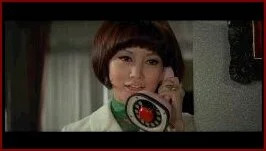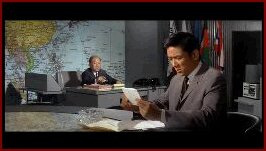|
Asia-pol
It was not an unusual practice for Hong Kong's powerhouse Shaw Brothers studio to participate in international co-productions during its heyday, and the result of that practice was often some fairly unique screen pairings. For instance, there was British horror icon Peter Cushing teaming up with kung fu badass David Chiang in The Legend of the Seven Golden Vampires and the Sentimental Swordsman himself, Ti Lung, trading lines with American TV movie staple and Night of the Lepus star Stuart Whitman in Shatter. But the 1967 spy thriller Asia-pol stands out in particular for being a potential wet dream for fans of 1960s Asian action cinema. This participation between Shaw and Japan's Nikkatsu - the studio that trademarked its own distinctive brand of hardboiled action cinema during the late fifties and sixties - boasts two stars who have, respectively, come to represent more than any others the identity of each of those studios at that moment in their histories. The mid sixties was, financially speaking, a dark time for the Japanese film industry, with television's negative impact on the big studios' coffers reaching critical mass. This situation created two conditions that were to prove advantageous to the then peaking Shaw Brothers operation; namely, a large number of newly unemployed Japanese film technicians - many accomplished directors and cinematographers among them - and an increased openness on the part of the major studios to cash infusions from foreign film companies. Shaw Brothers head Run Run Shaw, always seeking ways to increase his company's efficiency and productivity - as well as its scope and influence - had made a policy of participation and talent exchange with the Japanese film industry, based on the idea that exposure to its rigorous standard of craftsmanship could only stand to improve that of his own homegrown talent pool.
This international cross-pollination was not an entirely new practice for Shaw; the studio had, for instance, co-produced films with both Toho and Daiei during the fifties. But it saw, thanks in part to the aforementioned changes in the Japanese industry's fortunes, a greatly increased prevalence during the mid sixties, with Shaw not only sending its actors and technicians to Japan for training, but also importing Japanese talent for work on its own films. Among these imports were a number of directors who would turn out a wide range of successful - and not so successful - films for the studio - though they would often do so under assumed Chinese names, in order to avoid running afoul of anti-Japanese sentiment among the intended audience. These included the prolific Umetsugu Inoue, whose many colorful contributions to the Shaw catalog include the musicals Hong Kong Nocturne and Hong Kong Rhapsody, and Koh Nakahira - aka Yeung Shu Hei - who directed such films as Trapeze Girl, Diary of a Lady Killer and Inter-pol. Also on this list is Matsuo Akinori - aka Mai Chi-Ho - who, while continuing to direct pictures for Japan's Nikkatsu, would also helm the Lily Ho vehicleThe Lady Professional and, during the peak years of Shaw's Hong Kong/Japan synergy, the film we're discussing here, Asia-pol. Asia-pol in many ways fits in with the spate of James Bond knock-offs - such as Angel with the Iron Fist, Summons to Death and The Golden Buddha - that Shaw turned out between 1966 and 1968, but also exhibits some significant differences that can most likely be chalked up to its Nikkatsu pedigree. For one, while the action of those aforementioned films was largely limited to what could be shot on the sound stages and back lots of Shaw's Movie Town facility, Asia-pol is distinguished by a great deal of location shooting set on the streets of Japan, Hong Kong and Macao. This is a style of shooting that the Japanese crew, accustomed to the gritty, street-bound look of Nikkatsu's violent yakuza thrillers, would have been considerably more at ease with than would the Shaw's technicians. Likewise, Asia-pol's script, written by veteran Nikkatsu scribe Gan Yamazaki (who also wrote Nikkatsu's sole entry in the kaiju eiga genre, Gappa, the Triphibean Monster, as well as the colorfully titled Seijun Suzuki picture Detective Bureau 23: Go To Hell Bastards) gives us an espionage yarn that's considerably more down-to-Earth than the campy nonsense that Shaw would typically serve up, entirely free of hooded super villains and sci-fi inspired underwater lairs.
This is not to say, of course, that Asia-pol lacks that one far-fetched element key to all 1960s spy films: the suave and limitlessly masterful super agent. And here that super agent is played by Jimmy Wang-yu, a young Chinese actor who, at the time of filming Asia-pol, was on the cusp of becoming one of Shaw Brothers' biggest stars. Of course, the phenomenal success of The One Armed Swordsman, released that same year, would not only change the career course of Wang-yu, its star, but also of Shaw Brothers itself, steering the studio's martial arts output away from the mannered female swordsman films of the early sixties and toward the violent and hyper-masculine, kung fu driven films that its director, Chang Cheh, would come to specialize in. For Wang-yu's part, it was just the beginning of a series of films that would make him one of the most recognizable faces in sixties martial arts cinema. In Asia-pol, Wang-yu plays Yang Ming Xuan, a top agent in the Japanese branch of Asia-pol, a fictional pan-Asian Pacific police organization so secret that's it's doings are apparently unknown even to the governments and law enforcement of the countries in which they operate. (Yang is a resident Japanese of Chinese descent, thanks to him being adopted by a Japanese couple after being apparently orphaned in Hong Kong during the war.) As the film opens, Asia-pol is in the process of trying to shut down a criminal organization that is smuggling large quantities of gold into Japan by refining it into phonograph components. Yang Ming Xuan succeeds in intercepting the latest truckload of contraband, but the criminals stage a brazen helicopter attack, ruthlessly eliminating their own operatives and destroying most of the shipment before it can be confiscated. In the process, Ming Xuan's partner is killed, and the young agent is brought to the unwelcome attention of the leader of the smuggling operation, a suave and psychotic operative known (in the subtitles, at least) simply as George.
Playing George is Japanese actor Shishido Jo, aka Joe Shishido. Shishido, a Nikkatsu contract player, began his career with the studio as a romantic lead, but soon found himself lost in an over-crowded field. Wanting to give himself a distinctive edge, he went under the surgeon's knife, emerging with moviedom's most exaggerated pair of cheek bones this side of Chip and Dale. This transformation had the intended effect, leading to a successful rebirth as a screen tough guy - and, by the mid sixties, he was one of Nikkatsu's biggest stars, portraying an assortment of stylish assassins in a series of tailor-made screen vehicles. Shishido's bizarre appearance and unhinged intensity would make him a natural favorite for maverick director Seijun Suzuki and, by the time of making Asia-pol, he had already starred in two of Suzuki's standout films, Youth of the Beast and Gate of Flesh. That same year, 1967, would see him star in Suzuki's most infamous work, the hallucinatory Branded to Kill, a film that would simultaneously cement Suzuki's reputation while destroying his career as a director. Anyone who has seen that film knows that it is memorable as much for Shishido's ferocious performance as for its director's audacious style. Shortly after Ming Xuan's foiling of their latest smuggling attempt, George's gang assassinates a man known as Yang Zhang Qing, who is suspected of being the leader of the criminal organization's Hong Kong operation. Upon being informed of this by his superiors, Ming Xuan volunteers that he believes Yang Zhang Qing may be his real father and that, if so, could not have been a witting participant in the organization's criminal activity. With this revelation, Asia-pol introduces a sub-plot involving long lost siblings and vengeance of family honor that seems more like something out of an Indian masala film than a pan-Asian action thriller. After Ming Xuan is sent to Hong Kong to locate the gang's refining operation, he encounters a young woman, Ming Hua, who turns out to be a sister he never knew he had, and together the two set out to bring down George and clear their late father's name. Meanwhile, we learn that George is something of a loose cannon within his organization, a circumstance which leads to some violent internecine squabbles. From this point on, the film's action ping pongs back and forth between Hong Kong and Macao (the location of a gang-owned casino that is the front for its refining operation), with Ming Xuan and George likewise switching back and forth between predator and prey, all leading up to an abrupt conclusion aboard a Japan-bound freighter.
With its cinematography by Nikkatsu regular Kazumi Iwasa, Asia-pol is, above all else, a gorgeously shot motion picture. Its abundance of imaginatively lensed location footage makes it an alluring moving postcard of 1960s era Hong Kong and Macao, if nothing else. But watching it, you get the sense that its makers were content to have the picture coast on its good looks alone, as the film's dramatic and action set pieces, while always adequate, never seem to aspire to anything beyond that. Nowhere do you get the sense of a real desire to thrill that you do with, say, some of the better Eurospy films of the era, loaded as those are with outrageous situations and colorful gimmicks. Furthermore, those spy movie tropes that Asia-pol does pay service to seem to be, while still fun to watch, somewhat rote and obligatory (the gimmick of Asia-pol's Japanese HQ being entered through the fitting room of a tailor's shop, for instance, is lifted of a piece from the TV series The Man From U.N.C.L.E.). Still, to be fair, it should be noted that this comparatively unadorned narrative approach is in service of a plot considerably more complex than that of the typical secret agent potboiler of the era - even if that plot is diluted somewhat by the Bollywood-style family drama subplot referred to earlier. But Asia-pol's weakest point has to be Jimmy Wang-yu himself. Slight, boyish, and with a tendency to pout, Wang-yu is simply too lightweight to hold the film's center - or to stand up to the inevitable comparisons that the role he's been given invites. It's hard to imagine that any of Shaw's other 007 surrogates - such as The Golden Buddha's Paul Chang or Summons to Death's Tang Ching - wouldn't have been able to do a better job of commanding the screen. (Given Wang-yu's career defining roles in the One Armed Swordsman and One Armed Boxer films, I've got to wonder if he might have held more interest here if he'd been missing a limb.) The script, furthermore, does Wang-yu no favors, as the elements of family drama he's forced to play out simply serve to highlight his somewhat juvenile emotional range.
Shishido Jo, on the other hand, effortlessly exudes a very adult sense of authority and menace, which, as a result, makes those scenes in which he and Wang-yu face off come off like a disciplinary session between an exceptionally hip and borderline-maniacal parent and a petulant teenager. Whether it is because of this under-matched casting or simply the difficulties of working outside of his comfort zone, Shishido seems to be a little toned down here. Still, "toned down", in comparison to Shishido's performances in Gate of Flesh and Branded to Kill, leaves quite a wide margin for inspired, idiosyncratic villainy, and Shishido still delivers enough of his trademark combination of cool and crazy to easily walk away with the show. Despite not being all that it could have been, Asia-pol is nonetheless enjoyable. It has a budgetary sheen well beyond that of the typical releases from either studio at the time and, as a result, still has the feel of being something of an event picture. Furthermore, while it never threatens to overwhelm you with excitement, it moves along at a brisk, tightly edited pace, and is never less than engaging. Helping considerably to drive it along is a brassy original score by Toshiro Mayuzumi, which further sets the film apart from Shaw's typical spy output, given the latter's tendency to simply pilfer musical cues from You Only Live Twice. Still, being uniquely the product of, not just one, but two distinct cinematic golden ages, it cannot help but leave one with a sense of missed potential.
Within just a few years of Asia-pol's release, Nikkatsu hit financial rock bottom and was forced to retool itself from being a purveyor of action films to the stylish kink of the more lucrative Roman Porno films it became known for in the seventies. Shaw Brothers, on the other hand, would remain a dominant force in the world of martial arts cinema for most of the next decade, though advances in the state of the art and competition from emerging studios would force them out of the game by the mid-eighties. Though one couldn't reasonably expect a hybrid product like Asia-pol to provide a real taste of what distinguished each of these studios during those respective lost eras, it is a film worth seeing for its novelty value, as well as one that is solidly entertaining when taken on its own terms. In other words, it's a footnote, but a highly enjoyable one as footnotes go. (Note: Clip has German audio.) - Todd Stadtman 12/23/07 References:
|
||
|
All text content � Copyright 2007 Todd Stadtman. All rights reserved. |



















